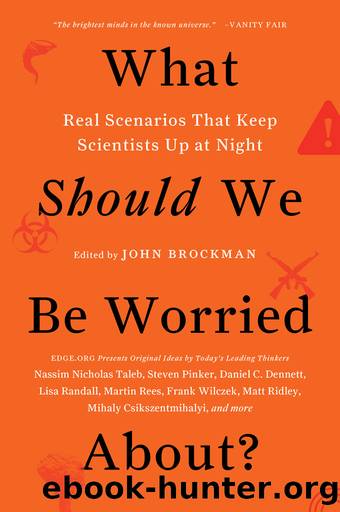What Should We Be Worried About? by John Brockman

Author:John Brockman
Language: eng
Format: epub
Publisher: HarperCollins
Published: 2013-12-19T00:00:00+00:00
IS THE NEW PUBLIC SPHERE . . . PUBLIC?
ANDREW LIH
Associate professor, Annenberg School for Communication & Journalism, University of Southern California; author, The Wikipedia Revolution
The advent of social-media sites has allowed a new digital public sphere to evolve by facilitating many-to-many conversations on a variety of multimedia platforms, from YouTube to Twitter to Weibo. It has connected a global audience and provided a new digital commons that has had profound effects on civil society, social norms, and even regime change in the Middle East. As important as it has become, are critical aspects of this new public sphere truly public?
There are reasons to be worried.
While we are generating content and connections that are feeding a rich global conversation unimaginable just ten years ago, we may have no way to re-create, reference, research, and study this information stream after the fact. The spectrum of challenges is daunting, whether itâs because information is sequestered in private hands, kept from full access, deleted from sight, retired with failed businesses, or shielded from copying because of legal barriers.
Twitter, in particular, has emerged as the heart of a new global public conversation. However, anyone who has ever used its search function knows that the second chance to find content is dubious. Facebook works in a private eyes-only mode by default and is shielded even more from proper search and inspection, not only by the public but even by the creators of the original content.
How about the easier case of individuals simply asserting control over their own content within these services? Users of social-media content systems still have sole copyright of their content, though the terms of service that users agree to is rather extensive. Twitterâs is fairly typical: âYou grant us a worldwide, non-exclusive, royalty-free license (with the right to sublicense) to use, copy, reproduce, process, adapt, modify, publish, transmit, display and distribute such Content in any and all media or distribution methods (now known or later developed).â
Without passing judgment on the extent or reach of these types of license agreements, the logistics of accessing oneâs own data are worrisome. Typically, these services (Twitter, Facebook, Weibo, Instagram, et al.) are the sole digital possessors of your words, links, images, or videos created within their systems. You may own the copyright, but do you actually possess a copy of what youâve put into their systems? Do you actually control access to your content? Do you have the ability to search and recall the information you created? Is public access to your data (e.g., through application programming interfaces) possible now, or guaranteed in the long term?
That we continue to use an array of information systems without assurances about their long-term survivability or commitment to open access, and without knowing whether or not they are good stewards of our history and of public conversation, should worry us all.
What can be done about this?
To its credit, Twitter has partnered with the Library of Congress to hand over the first four yearsâ worth of tweets, from 2006 to 2010, for research and study.
Download
This site does not store any files on its server. We only index and link to content provided by other sites. Please contact the content providers to delete copyright contents if any and email us, we'll remove relevant links or contents immediately.
The Art of Thinking Clearly by Rolf Dobelli(10405)
Mindhunter: Inside the FBI's Elite Serial Crime Unit by John E. Douglas & Mark Olshaker(9308)
Change Your Questions, Change Your Life by Marilee Adams(7728)
Nudge - Improving Decisions about Health, Wealth, and Happiness by Thaler Sunstein(7687)
Mastermind: How to Think Like Sherlock Holmes by Maria Konnikova(7312)
The Power of Now: A Guide to Spiritual Enlightenment by Eckhart Tolle(5740)
Men In Love by Nancy Friday(5225)
Altered Sensations by David Pantalony(5091)
Factfulness: Ten Reasons We're Wrong About the World – and Why Things Are Better Than You Think by Hans Rosling(4729)
The Confidence Code by Katty Kay(4242)
Thinking in Bets by Annie Duke(4212)
Man and His Symbols by Carl Gustav Jung(4118)
The Worm at the Core by Sheldon Solomon(3475)
Why Buddhism is True by Robert Wright(3439)
Liar's Poker by Michael Lewis(3436)
Three Women by Lisa Taddeo(3418)
The Inner Life of Animals by Peter Wohlleben(3300)
Descartes' Error by Antonio Damasio(3264)
How Music Works by David Byrne(3252)
